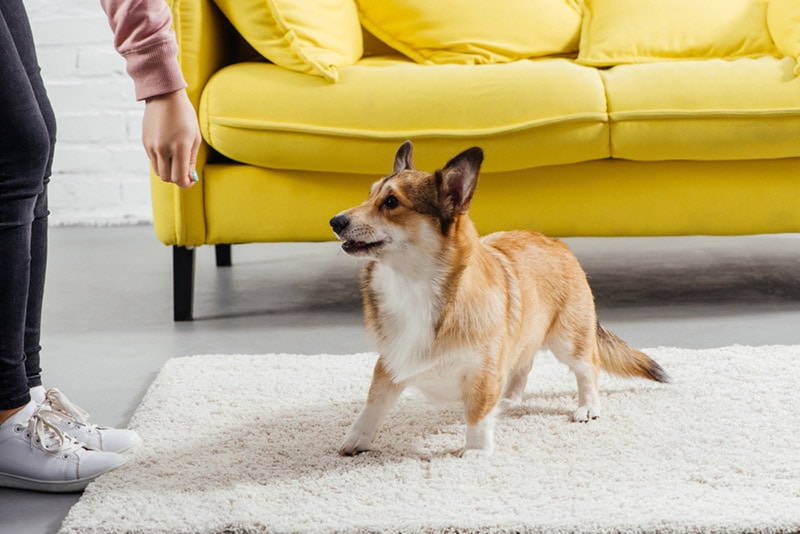
Are you tired of fighting your dog for space in the bed? If so, you’re not alone. It’s a common problem dog owners around the world have, and once you start letting your dog sleep in your bed, it can be a challenge to get them to stop.
But just because it will take a little work doesn’t mean you can’t do it. It will take a little persistence and know-how, but with the following eight tips, there’s no reason you can’t get your dog to stop sleeping in your bed in no time.
The 8 Tips to Get Your Dog to Sleep in Their Own Bed
1. Get a Comfortable Dog Bed

Do you want to sleep in an uncomfortable bed at night? Well, neither does your dog. If you want them to stop jumping up in your bed at night, you first need to get them a comfortable bed they can call their own.
It shouldn’t be too large, small, hard, or soft. And the problem for you is that your pup gets to decide what they like. With this in mind, it might take a few tries to get the perfect dog bed for them. But once you have what they like, it’ll be much easier to get them to consistently use it at night.
2. Teach Them Basic Commands
You need your dog to listen to you to get them to do what you want, and this starts with some basic commands. Teach them their name, to come when called, and to stay in a specific spot. Once they master these basics you can move on to the “bed” command.
It doesn’t matter what phrase you use, but you need a command that tells them to go to bed. If they already listen to you when they hear it, they should go to their bed. This might take some time, but it’s essential if you want your dog to stop sleeping in your bed.
3. Add Familiar Items

Your dog wants to be close to you, and there’s nothing wrong with that. While you don’t want them in your bed at night, there’s no reason you can’t add a few of your items to their bed to make it feel safe and like you.
T-shirts and other clothing items work great here, but a blanket you use is another fine choice. Just be sure to swap it out every few days with something else that has your scent on it.
4. Stay Patient
Whenever you’re training your dog to do something new, you can’t expect them to learn it right away. It’s a process, and processes take time. There are going to be some hiccups along the way, and it’s not going to happen overnight.
Stay patient and trust the process. If you stick with it, your dog will be out of your bed and in theirs in no time.
5. Train Outside the Bedroom

If your bed is right there, you really can’t blame your dog for wanting to jump up into it. But if you put their bed in a separate room and train them in that room, you’ll get faster results. Once your dog doesn’t sleep in your bed anymore you can consider moving it into your room, but both you and your pup might enjoy your own space.
6. Use Positive Reinforcement
Whenever you’re training your dog, you need to stick solely with positive reinforcement. Your dog wants to make you happy; they don’t know how to do it yet! But by rewarding them for the desired behavior, you’re actively encouraging the behavior you want from them.
Stay positive and keep giving them the love and affection they desire and they’ll go sleep in their own bed before too long.
7. Stay Consistent

Once you start trying to get your dog out of your bed, you need to stick with it. If your pup learns that they need to keep bugging you until you cave, that’s exactly what they’ll do.
Set consistent training times for them to practice going to bed, and from now on keep them out of your bed, even throughout the day. They need to learn that it’s your space, and the only way to do this is to stay consistent with everything day after day and night after night. Make sure to close your bedroom door when you are away to keep the dog from climbing into your bed because you are not around to stop them.
8. Reward Them
Sometimes our pups need a little extra incentive to sleep in their bed, and there’s nothing wrong with that. Treats are a great way to get them hyper-focused on what you want from them.
Start by rewarding them as soon as they get into bed, and then slowly increase the time intervals between treats for them to stay there. Before long, all you’ll need to do is give them a treat in their bed, and they’ll happily stay there all night.
How Long Should It Take to Get Your Dog to Stop Sleeping in Your Bed?
This really depends on your dog and how long they’ve already spent sleeping in your bed. If you’re trying to stop them from doing something they’ve done for years, it will take a lot longer than if you’re trying to prevent them from doing it for the first time.
For puppies, you can expect the process to take a few days, but for older stubborn dogs it might take a few weeks to a few months. Stay patient with it and your dog will learn to love their new bed, even if it is an adjustment for them.
Conclusion
We know it can be a frustrating experience, but if you stick with the tips we’ve highlighted above and give it a little time, there’s no reason you can’t have your dog sleeping in their own bed throughout the night in no time.
It might be frustrating now, but it’ll all be worth it when you can stretch out and get a good night’s sleep every night!
Featured Image Credit: Unwind, Shutterstock








